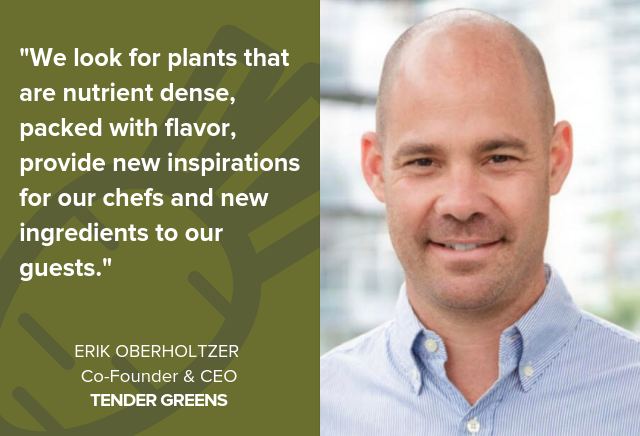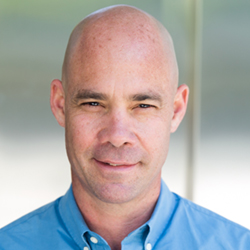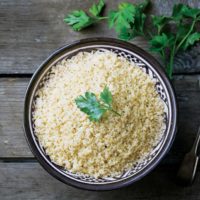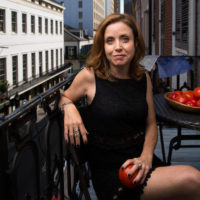
Food+Tech Connect and The Future Market are hosting Biodiversity: The Intersection of Taste & Sustainability, an editorial series featuring interviews with over 45 leading food industry CEOs, executives, farmers, investors and researchers on the role of biodiversity in the food industry. See the full list of participants and read about why biodiversity in food is important here. We are also producing a biodiversity exhibit at The Winter Fancy Food Show, so please stop by to say hello.
Below, I speak with Erik Oberholtzer, co-founder and CEO of Tender Greens , a chef-led fast casual restaurant serving seasonal and responsibly-sourced food. Oberholtzer is on a mission to incorporate overlooked and underutilized ingredients into Tender Greens’ menus. The restaurant’s first step has been to add fonio, an African ancient grain, to the restaurant’s core menu in 2018. It is also working with seed banks, farmers who have plant scientists on team and Tender Greens chefs to plant rare seeds, provided by Crop Trust, and experiment with them in the kitchen. This year, Oberholtzer is collaborating with Crop Trust on the Food Forever Experience, hosting events in five countries and inviting global chefs to cook with diverse ingredients from the Rediscovered Food Initiatives list of 25 of ingredients to help shape future menus.
_____________________
Danielle Gould: Is biodiversity a priority for Tender Greens? If so, how and why?
Erik Oberholtzer: Yes, we look for plants that are nutrient dense, packed with flavor, provide new inspirations for our chefs and new ingredients to our guests. We search for ingredients that have been overlooked by the broader commercial food system. The use of new, diverse ingredients is important to local and global agriculture as climate change challenges historic varietals and practices. Our collaboration with the Food Forever Initiative and Crop Trust to achieve the UN’s SDG 2.5 by 2020 is a key driver. Our first action in 2018 has been to add fonio to our core menu. Fonio is at the edge of the global food system. We believe it could be the next quinoa based on culinary range, nutritional properties and importance as a drought resistant grain.
DG: How does Tender Greens define and think about biodiversity? What does an ideal biodiverse food system look like? How do you measure biodiversity, and when will we know when we’ve arrived at a “good” level of biodiversity?
EO: Sixty percent of the world’s food consumption comes from 4 crops- wheat, rice, soy and corn. These ingredients are at the heart of the industrialized food system that relies on mono cropping, GMO seed varieties that rely on petroleum inputs and pest prevention. A more diverse food system grounded in regenerative systems that are good for the soil, good for the body and good for the planet are key to a better, more resilient future. Any percentage shift away from the 60% is a measure of success. We have identified a list of 25 ingredients we are calling “rediscovered foods.” These are at the edge of the food system but significant enough to scale. Success in re-introducing these 25 would be a great success. After that we have many more so the process never ends.
DG: What is Tender Greens doing or planning to do to promote biodiversity?
EO: I will be leading a global network of chefs in five countries in 2019 on an awareness effort called the Food Forever Experience. We will challenge chefs to cook from a list of diverse ingredients to help shape future menus. They will also be asked to weave these ingredients into their menus to expose their audiences to these diverse ingredients. We are scheduled to host events in Peru, Chicago, Costa Rica, Rome and London in 2019. Tender Greens will introduce many of these ingredients onto our menu starting with fonio.
DG: What is the business case for promoting a more biodiverse food system?
EO: From a supply chain perspective the more robust our food system the better for business. As a brand in today’s world the more we demonstrate we are part of the solution to a broken food system than part of the problem the better for the brand’s image. As a cost measure, many of these ingredients are inexpensive and therefore potentially great for ingredient cost.
DG: What investments need to be made to create a more biodiverse food system?
EO: The key to a more biodiverse food system is a shift in consumer behavior. We need to manage our addiction to cheap processed food. Brands need to invest in educating the public on WHY and HOW they can vote with their dollars. Farmers need to transition from conventional methods to regenerative farming practices. Governments will need to shift their focus from industrial methods to those supporting a more diverse food system
DG: Does your average customer care about biodiversity today? Why should they care? How do you (or will you) get them to care?
EO: I do not believe most people understand the complexity of our food system and therefore do not care. They do care about climate change, world hunger, personal wellness and all of these things tie back to biodiversity. So they do care, they just don’t know yet. We can shift attention bit by bit. Meet people where they are at. I believe if we make diverse ingredients craveable, relatable and affordable we can change behavior.
DG: What are the greatest challenges and opportunities your organization faces for creating a more biodiverse agricultural system, and what are you doing to overcome or capture them?
EO: The biggest challenge is introducing unknown ingredients to compete with broadly accepted ingredients at a time when competition is intense. The other challenge is sourcing and scaling these ingredients if and when successful.
DG: How are you testing biodiverse ingredients on your menu? How are you or how do you plan to handle the sourcing and scaling of the ingredients that are successful?
EO: Bit by bit. We are beginning with fonio. It has been less challenging to source at scale, has great nutritional properties that consumers can embrace, is user friendly for the culinary team and plugs in nicely to the happy vegan on our main menu. We also are working on a rare seed project in partnership with the crop trust. The goal here is to work with seed banks, select farmers with plant scientists on team and our chefs to unlock the magic hidden in some of these vaults. It is a slow, low yield project but when unlocked offers a glimpse into the heritage and flavors of times long passed over. This is a project of curiosity where we invite select audiences in for a first look at ancient varietals. Many of these “first looks” will be events like food forever, WWF or intimate dinner parties in Brooklyn. More to come in 2019 but we hope to amplify the experience through shared social and collaborations with other chefs and farmers.
DG: What are some of the most important things restaurants can do to support biodiversity?
EO: Add new ingredients to the menu and talk about them in a way that people can absorb
DG: Are there certain products you would like to see more of in the food industry — either in foodservice or CPG — that would help promote a more biodiverse agricultural system?
We are starting with the list of 25 rediscovered foods.
DG: What is your vision for what a more biodiverse food system looks like in 10-15 years?
EO: We have moved beyond organic and now look at regenerative systems that rely on and celebrate the use of diverse ingredients. That our shelve and menus are filled with more ingredients in a decades time that we have not today heard of or tasted. That consumer demand drives the food system to plant with more diversity and relieve the impact on environment by agriculture. That some fields are rewilded to improve the health of ecosystems beyond those specific to agriculture.
DG: Anything else you want to share?
EO: This effort requires all stakeholders to work together in shaping a more diverse food system. At the heart of it all is the consumer. If consumers understand their role and act three times per day with meal choices that align with this vision we can achieve our goal of creating a more biodiverse food system. If we fail to change culture, we fail in this vision of the future.
Read all of the interviews here and learn more about Biodiversity at The Future Market.
____________________________
 Erik Oberholtzer, Co-Founder and CEO of Tender Greens
Erik Oberholtzer, Co-Founder and CEO of Tender Greens
Erik Oberholtzer co-founded Tender Greens in 2006 in Culver City, California, a chef driven, organic, fast-casual restaurant concept with locations in Los Angeles, San Francisco Bay Area, Orange County, San Diego and New York.
A professionally trained chef, Erik manages a growing team of talent along with some exciting new brands. He is the founder of the Tender Greens Sustainable Life Project, a program aimed at assisting at risk youth develop new skills and career intentions through structured culinary training and farm exposure. He is also co-founder of P. Balistreri Salumi Company, the first of their unique chef legacy companies he has helped incubate and bring to market through Tender Greens.
Erik earned his undergraduate degree in Psychology at Temple University in Pennsylvania and a degree in Culinary Arts at Johnson & Wales in Providence, Rhode Island.





